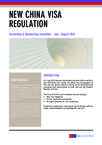New China visa regulation
New China visa regulation
The China Exit-Entry law introduces several changes:
- New visa categories
- Stricter application procedures
- Stringent penalties for non-compliance
Companies employing or planning to recruit foreign staff are highly recommended to acknowledge the new law.
NEW VISA CATEGORIES
Previous visaNew visaPurposeF visa (business visa)M visa (business visa)Issued to individuals coming for business and trade activities, but not to workF visa Now only applicable for non-business exchanges and visits (scientific, educational, cultural, health and sports)R visa (talent visa) R1 - Long term R2 - Short termAvailable to highly skilled foreign professionals whose expertise will be in demand in China (list of eligible occupations to be released later)Q visa (family reunion)Issued to children of Chinese citizens or permanent residents, entitling the visa holder to work in China for less than 90 daysZ visa (work) Z1 Z2Issued for work period over 90 days Issued for work period less than 90 daysX visa (study)X1 X2Long-term study Short-term study (180 days or less)J visa (journalism)J1 J2Issued for long-term stay Issued for short-term stay (180 days or less)Note: A new “90-day rule” limits the cumulative stay of business visa holders to no more than 90 days in any calendar year.
STRICTER VISA APPLICATION PROCEDURE
Extended processing time
- For an employment license, the processing time is now 15 days.
- For the application of the initial residence permit or the renewal, the processing time has increased from 5 days to 15 days.
- For the renewal of a M visa, the processing time has been extended to 7 working days and the application must be submitted and accepted for processing by the authorities at least 7 days prior to the visa expiration.
Additional documentation
- Bachelor’s degree and two years of relevant working experience is now mandatory for visa application.
- Non-criminal record certificate (with Chinese translation legalised by the relevant Chinese Consular post) is required in Beijing as of 1 July 2013.
Scrupulous examination on eligibility criteria
- Z visas are subject to age requirements. Any foreigner above the legal retirement age in China (55 for women and 60 for men) may have the possibility to work as a consultant up to the age of 70.
Note: The new law does not address the visa arrangements for interns and students employed for part-time job. It is therefore difficult for employers to ensure compliance so we recommend to liaise with the University to which the interns / students are enrolled in order to check whether there are any agreement.
STRINGENT PENALTIES FOR NONCOMPLIANCE
- Employers employing foreigners illegally are liable to a RMB10,000 fine for each illegal employee (capped at RMB100,000).
- Any foreigner found working illegally will be liable to a fine ranging between RMB5,000 and RMB20,000.
- Foreigners found living in China illegally are liable to both a fine of up to RMB500 per day (capped at RMB10,000) and a detention for 5-15 days.
EMPLOYERS - WHAT TO EXPECT?
The new law provides incentives for the local authorities to enforce policy.
Employers should be prepared for:
- More stringent review of employee periods of stay in China, especially for those on business visa
- Increased random checks of corporate documentation (i.e. business licenses)
- Documenting time spent in China for their expatriate employees and all on-site employees
Quick wins for employers
- Check the visa compliance status for each foreign employee and check the potential future foreign employee’s visa eligibility before offering a position in China.
- Create a formal dashboard to maintain detailed records for each foreign employee, encompassing:
- registration documents with the Public Security Bureau
- updated Residence Permit documentation
- primary work location
- work authorization documents
- type of visa
- visa delivery and expiry dates
- deadline for submitting the visa renewal application
- time spent in China on business visas
- etc.
- Assign the responsibility of keeping this dashboard up-to-date (e.g. HR department, your business advisors, etc.)
- Raise the awareness internally amongst your foreign employees and encourage a pro-active attitude.

